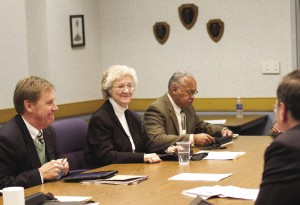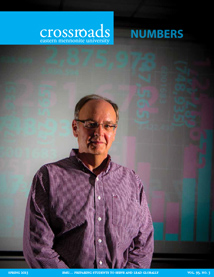
Jill Goyette Head ’02
Jill Goyette Head ’02 stumbled into public finance as an intern in the city office in Hiram, Georgia, fulfilling a requirement for a master’s in public administration degree from Kennesaw State University. It was 2006, and the City of Hiram, a bedroom community west of Atlanta, was in a desperate position. After the death of a long-serving mayor and the departure of several staff members, city affairs were in some disarray. Water bills and checks were still being prepared by typewriter. The city had just one computer in the office and no formal accounting system. Though she had no training in accounting, nor was she particularly good with numbers, Head was bright and motivated. Before long, they’d hired her on full-time as the city treasurer, in charge of a $2.2 million budget and about $8 million in savings the city had tucked away in various bank accounts.
“Ethics was always a major focus in my studies at EMU,” says Head, who majored in sociology and earned an associate’s degree in biblical studies. “Many of the early projects that I worked with focused on making the financial management and procurement practices for the city more ethical and fiscally responsible.”
It wasn’t always an easy task; working in the city office threw Head into small-town politics at its tawdry, cronyistic worst. Things got even more difficult when the recession hit hard in Hiram, which relied almost entirely on business tax revenue. As staff wages were frozen and infrastructure and other community projects went unfunded, Head helped organize an economic development group with neighboring localities and worked with a healthcare company on the construction on a new hospital in Hiram.
Though her work dealt with numbers, Head discovered that effective teamwork and honest communication – skills that she’d acquired during her undergraduate studies at EMU – were among the most important ones she needed as city treasurer.
That’s also been the experience of Carolyn Dull ’97, the vice-mayor for the City of Staunton, Virginia. While a grasp of basic math is important when working on budgets, she said, an ability to translate those figures into something people can understand is a key skill.

Carolyn Dull ’97
“It’s always been important to communicate what the numbers mean without making people’s eyes glaze over,” said Dull, who spends significant time each spring working with other council members on Staunton’s nearly $100 million annual budget.
Dull, who originally fell into accounting because she was tired of paying someone else to do her taxes, works during the day as the business manager for the Augusta Correctional Center, where she oversees its budget and other financial matters. She has also held similar positions at a hospital, the Virginia School for the Deaf and Blind, and several social service agencies. She enrolled in EMU’s Adult Degree Completion Program to earn a bachelor’s degree that eventually allowed her to become a CPA.
“When I attended EMU, I felt like I was among people who shared many of my values, such as a strong work ethic, honesty and integrity. It was a validation of my beliefs,” said Dull, whose first run for city council in 2006 was motivated by a desire to apply those values to public service. Out in the wider world of finance and accounting, taking a stand for those kinds of values “can make you feel like a voice in the wilderness,” she says.
Jill Head stepped back to a part-time position at the City of Hiram in 2010, after the birth of her first child. By early 2012, a worsening economic situation and continued upheaval on the city council culminated in a somewhat welcome layoff. Now a stay-at-home mother of two young children, Head also works part-time in finance and accounting with a small CPA firm. She would enjoy returning to public finance at some point.
Dull’s term on the Staunton City Council runs through 2014; she hasn’t decided whether she’ll run again for a third term. In the meantime, she hopes to lead by example and play some part in restoring public faith in the government’s ability to solve problems.
“‘Government’ is just people coming together to do things that they can’t do by themselves,” said Dull. “I am hopeful that our society will begin to see the importance of accountability in public finance, and that we should return to admiring those qualities instead of ‘what you can get away with.’” — Andrew Jenner ’04
